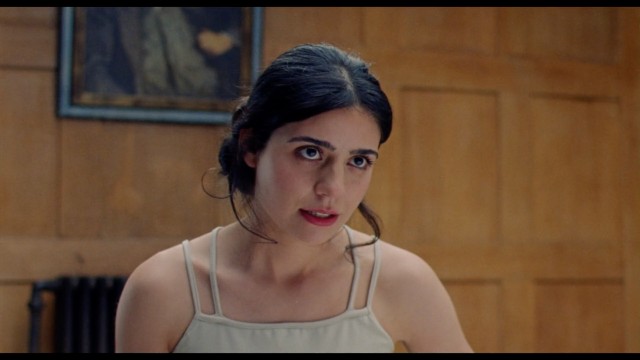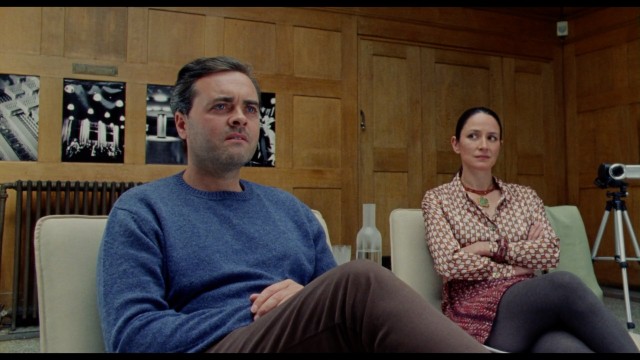Blurry in its lines and deep in concept, Roxy Rezvany’s Honesty left me contemplating: how do I feel, how does the protagonist feel, and what is truth? At the beginning, the film clearly presents itself as something “fake”, but as it progresses, it evolves into something very “real”. As we watch the protagonist, a young actress, rehearse a scene where she unfolds an abusive relationship with her partner in a hopeless and desperate interrogation. At a crucial point, she is coerced to think of her personal life, thus connecting her to the character, and the performance then transcends mere acting, becoming something entirely different.
The topic of this film is very much a discussion of authority and the dynamics of being a woman (or female presenting) in male dominated spaces, such as an interrogation room or the film industry. By blending these two worlds, the film encourages viewers to reconsider the nature of auditions, performances, and the roles women play in these settings. Ethnicity, faith, and gender are all explored here, but so is the film industry. The narrative, co-written by Rezvany and Emily Renée (who also plays the lead character), is rich with layers that are sure to provoke extensive discussion. How you “read” it will largely depend on your own interpretations.

Emily Renée, who also co-wrote the film, stars as Lily, the actress.
From the opening shot of the actress nervously fiddling with her hands, it is clear she is in a submissive position, a vulnerability that is fully exploited. That initial “unreal” scenario quickly gaining an intense realism, not only through its emotional impact but also by delving into the socio-political dynamics of identity.
In a cohesive manner, the narrative the actress conveys in Honesty also embodies these themes, as does the film’s form. Everything working in unison to challenge the viewer to dig deeper. The film’s form is meticulous and stubborn, with relentless close-ups forcing a sense of mental proximity and discomfort. While unusual angles are employed to make the setting feel cold and distant.
One of my favorite shots is where the camera, at a low straight angle, captures the actress from behind, with the man in the background in full view as he watches her put on a head scarf. As he stares deeply at her and exclaims, “that’s it, now I see it”, the edit cuts back to the actress as we witness her to process exactly what has happened.

“The film’s starting point was exploring the moment of realisation that how someone else perceives you may not be how you perceive yourself” – Rezvany discussing the inspiration behind Honesty
The framing is obviously intentional throughout the film and everything it achieves is strikingly unnatural and jarring. Discussing the interrogation of form and story together, Rezvany explains that she “wanted the aesthetic decisions to creep up on you, matching how the drama unfolds”, while also keen to exercise “a lot of restraint and focus to match the precision intended in the writing.”
Pulling inspiration from films featuring interrogations of women (The Passion of Joan of Arc, The Silence of the Lambs, Basic Instinct, Black Swan, etc), Rezvany shared these works with cinematographer Adric Watson (Fitting), to ensure his work was instrumental in the director’s aim for the film to prioritize “capturing body language and performance”. While production designer Elena Isolini (MJ) pushed the director to be “selective” with their use of color and texture, so the impact would “emerge from the film rather than hit viewers head on.”
Honesty tackles weighty themes, but it does so with a lightness that makes it accessible. Despite the serious topics it addresses, the film is far from miserable; in fact, it is thoroughly enjoyable and brilliant. Something we’ve come to expect from the work of Rezvany, who’s returning to the pages of Short of the Week for a third time, after previous features Little Pyongyang and Wifi Rider. A filmmaker we hold in the highest esteem, we’re hyped to see what they do next!
